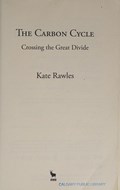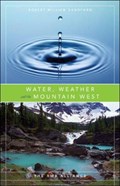Narrow Results By
A..."climate"...ising to Alberta in the dawn of the Anthropocene
https://archives.whyte.org/en/permalink/catalogue20009
- Medium
- Library - Periodical
- Author
- Skrajny, Joanna
- Publisher
- The Alberta Wilderness Association Journal
- Call Number
- P
1 website
- Author
- Skrajny, Joanna
- Responsibility
- Joanna Skrajny
- Publisher
- The Alberta Wilderness Association Journal
- Physical Description
- p. 22 - 25
- Medium
- Library - Periodical
- Abstract
- Pertains to climate change during Anthropocene including increased wildfires, ticks, and tick-borne diseases, floods, increase in insurance rates, and negative effects on health and mental health, wildlife extinction, decrease in fresh water.
- Notes
- In Wildlands Advocate, Vol. 27, No.2, June 2019, p. 22 - 25
- Call Number
- P
- Collection
- Archives Library
- URL Notes
- Digital version of publication available online
Websites
This material is presented as originally created; it may contain outdated cultural descriptions and
potentially offensive content.
Read more.
An impending water crisis in Canada's western prairie provinces
https://archives.whyte.org/en/permalink/catalogue24934
- Medium
- Library - Book (including soft-cover and pamphlets)
- Published Date
- 2006
- Author
- Schindler, D.W.
- Donahue, W.F.
- Publisher
- Proceedings of the National Academy of Sciences of the United States of America
- Call Number
- 03.5 Sc1a PAM
1 website
- Author
- Schindler, D.W.
- Donahue, W.F.
- Responsibility
- D.W. Schindler
- W.F. Donahue
- Publisher
- Proceedings of the National Academy of Sciences of the United States of America
- Published Date
- 2006
- Physical Description
- 6 pages ; illustrations , maps
- Abstract
- Canada is usually considered to be a country with abundant freshwater, but in its western prairie provinces (WPP), an area 1/5 the size of Europe, freshwater is scarce. European settlement of the WPP did not begin until the late 19th and early 20th centuries. Fortuitously, the period since European settlement appears to have been the wettest century of the past two millennia. The frequent, long periods of drought that characterized earlier centuries of the past two millennia were largely absent in the 20th century. Here, we show that climate warming and human modifications to catchments have already significantly reduced the flows of major rivers of the WPP during the summer months, when human demand and in-stream flow needs are greatest. We predict that in the near future climate warming, via its effects on glaciers, snowpacks, and evaporation, will combine with cyclic drought and rapidly increasing human activity in the WPP to cause a crisis in water quantity and quality with far-reaching implications.
- Notes
- In PNAS May 9, 2006 103 (19) 7210-7216
- Call Number
- 03.5 Sc1a PAM
- Collection
- Archives Library
- URL Notes
- Available online via PNAS's website
Websites
This material is presented as originally created; it may contain outdated cultural descriptions and
potentially offensive content.
Read more.
Brushes with climate change - Rockies Repeat project explores the intersection between conservation, art, history, and culture
https://archives.whyte.org/en/permalink/catalogue25227
- Medium
- Library - Periodical
- Published Date
- 2020
- Author
- Campbell, Brooke
- Call Number
- P
1 website
- Author
- Campbell, Brooke
- Responsibility
- Brooke Campbell
- Published Date
- 2020
- Physical Description
- p. 12 - 13
- Medium
- Library - Periodical
- Abstract
- Pertains to the Rockies Repeat Project which involves a group of women travelling to specific locations and re-creating the paintings of Peter Whyte and Catharine Robb Whyte with the end result of creating a documentary, exhibition and digital storytelling capsule
- Notes
- In Canada's History, Vol. 101, No.2 (April-May)
- Call Number
- P
- Collection
- Archives Library
- URL Notes
- Available online
Websites
This material is presented as originally created; it may contain outdated cultural descriptions and
potentially offensive content.
Read more.
The carbon cycle : crossing the Great Divide
https://archives.whyte.org/en/permalink/catalogue26209
- Medium
- Library - Book (including soft-cover and pamphlets)
- Published Date
- 2013
- Author
- Rawles, Kate
- Publisher
- Victoria, BC : Rocky Mountain Books
- Call Number
- 02.8 R21c
- Author
- Rawles, Kate
- Publisher
- Victoria, BC : Rocky Mountain Books
- Published Date
- 2013
- Physical Description
- 336 pages ; 15 cm
- Abstract
- In 2006 “outdoor philosopher” Kate Rawles cycled 4553 miles from Texas to Alaska, following the spine of the Rocky Mountains as closely as possible. Cycling across unforgiving but starkly beautiful landscapes in both the United States and Canada – deserts, high mountain passes, glaciers and eventually down to the sea – she encountered bears, wolves, moose, cliff-swallows, aspens and a single, astonishing lynx. Along the way, she talked to North Americans about climate change – from truck drivers to politicians – to find out what they knew about it, whether they cared, and if they did, what they thought they could do. Kate tells the story of a trip in which she has to deal with the rigours of cycling for ten hours a day in temperatures often in excess of 100° F, fighting punctures, endless repairs and inescapable, grinding fatigue … . But in recounting the physical struggle of such a journey, she also does constant battle with her own ideas and assumptions, helping us to cross the great divide between where we are on climate change and where we need to be. Can we tackle climate change while still keeping our modern Western lifestyles intact? Should we put biofuel in our camper vans and RVs? Or do we need much deeper shifts in lifestyles, values and worldviews? -- From publisher
- ISBN
- 9781927330777
- Accession Number
- P2023.25
- Call Number
- 02.8 R21c
- Collection
- Archives Library
This material is presented as originally created; it may contain outdated cultural descriptions and
potentially offensive content.
Read more.
Dark days at noon : the future of fire
https://archives.whyte.org/en/permalink/catalogue26239
- Medium
- Library - Book (including soft-cover and pamphlets)
- Published Date
- 2022
- Author
- Struzik, Edward
- Publisher
- Montreal ; Kingston ; London ; Chicago : McGill-Queen's University Press
- Call Number
- 04 St8d
- Author
- Struzik, Edward
- Publisher
- Montreal ; Kingston ; London ; Chicago : McGill-Queen's University Press
- Published Date
- 2022
- Physical Description
- ix, 291 pages : illustrations (chiefly colour), colour map ; 27 cm
- Abstract
- The catastrophic runaway wildfires advancing through North America and other parts of the world are not unprecedented. Fires loomed large once human activity began to warm the climate in the 1820s, leading to an aggressive firefighting strategy that has left many of the continent's forests too old and vulnerable to the fires that many tree species need to regenerate. Dark Days at Noon provides a broad history of wildfire in North America, from pre-European contact to the present, in the hopes that we may learn from how we managed fire in the past, and apply those lessons in the future. As people continue to move into forested landscapes to work, play, live, and ignite fires--intentionally or unintentionally--fire has begun to take its toll, burning entire towns, knocking out utilities, closing roads, and forcing the evacuation of hundreds of thousands of people. Fire management in North America requires attention and cooperation from both sides of the border, and many of the most significant fires have taken place at the boundary line. Despite a clear lack of political urgency among political leaders, Edward Struzik argues that wildfire science needs to guide the future of fire management, and that those same leaders need to shape public perception accordingly. By explaining how society's misguided response to fire has led to our current situation, Dark Days at Noon warns of what may happen in the future if we do not learn to live with fire as the continent's Indigenous Peoples once did. -- Provided by publisher.
- Contents
- Introduction -- 1. Prelude to the dark days at noon -- 2. The fire triangle -- 3. More dark days coming -- 4. The big burn -- 5. Big burns in Canada -- 6. Paiute forestry -- 7. Fire suppression -- 8. The Civilian Conservation Corps -- 9. Canada's Conservation Corps -- 10. The fall of the Dominion Forest Service -- 11. The royal commission into wildfire -- 12. White man's fire -- 13. International co-operation -- 14. Blue moon and blue sun -- 15. Nuclear winter -- 16. Yellowstone: A turning point -- 17. Big and small grizzlies -- 18. Climate and the age of megafire -- 19. The holy shit fire -- 20. The Pyrocene -- 21. Nuclear winter: Part two -- 22. Owls and clear-cuts -- 23. Water on fire -- 24. The Arctic on fire -- 25. The big smoke -- 26. Fire news -- Conclusion.
- ISBN
- 9780228012092
- Accession Number
- P2024.02
- Call Number
- 04 St8d
- Collection
- Archives Library
This material is presented as originally created; it may contain outdated cultural descriptions and
potentially offensive content.
Read more.
Innovate : the Mountain Legacy Project
https://archives.whyte.org/en/permalink/catalogue25006
- Medium
- Library - Periodical
- Published Date
- 2019/2020
- Author
- Anthony, Leslie
- Call Number
- P
1 website
- Author
- Anthony, Leslie
- Published Date
- 2019/2020
- Medium
- Library - Periodical
- Subjects
- Mountains
- Photography
- Climate
- Climate change
- Glaciers
- Abstract
- Pertains the the Mountain Legacy project and their use of repeat photography and historic photographs to chart changes in climate in the Canadian Rocky Mountains
- Notes
- In Mountain Life Annual, 2019/2020, pg. 42 - 43
- Call Number
- P
- Collection
- Archives Library
- URL Notes
- Mountain Life Annual website
Websites
This material is presented as originally created; it may contain outdated cultural descriptions and
potentially offensive content.
Read more.
On the rocks : the local impacts of glacial melt
https://archives.whyte.org/en/permalink/catalogue20030
- Medium
- Library - Periodical
- Published Date
- 2015
- Author
- Payne, Colin
- Call Number
- P
1 website
- Author
- Payne, Colin
- Responsibility
- Colin Payne
- Published Date
- 2015
- Medium
- Library - Periodical
- Abstract
- Pertains to the de-glaciation of Western Canada during the 21st century with the Athabasca Glacier as the example
- Notes
- In Highline Magazine, Iss. 16, Fall 2015, p. 40 - 45
- Call Number
- P
- Collection
- Archives Library
- URL Notes
- Highline website
Websites
This material is presented as originally created; it may contain outdated cultural descriptions and
potentially offensive content.
Read more.
Peyto : a hotbed of glacier science
https://archives.whyte.org/en/permalink/catalogue19950
- Medium
- Library - Periodical
- Published Date
- 2012
- Author
- Martel, Lynn
- Call Number
- P
1 website
- Author
- Martel, Lynn
- Responsibility
- Lynn Martel
- Published Date
- 2012
- Medium
- Library - Periodical
- Abstract
- Pertians to Peyto Glacier and glacier monitoring programs through Natural Resources Canada
- Notes
- In Highline Magazine, Vol.4, Iss.1, Winter 2012, p.36-41
- Call Number
- P
- Collection
- Archives Library
- URL Notes
- Highline website
Websites
This material is presented as originally created; it may contain outdated cultural descriptions and
potentially offensive content.
Read more.
Water, weather and the mountain west
https://archives.whyte.org/en/permalink/catalogue13641
- Medium
- Library - Book (including soft-cover and pamphlets)
- Published Date
- 2007
- Author
- Sandford, Robert W
- Publisher
- Surrey, B.C. : Rocky Mountain Books
- Call Number
- 03.5 Sa5wa c.1
- 03.5 Sa5wa c.2
- 03.5 Sa5wa ref. c.3
1 website
- Author
- Sandford, Robert W
- Publisher
- Surrey, B.C. : Rocky Mountain Books
- Published Date
- 2007
- Physical Description
- 207 pages : illustrations
- Subjects
- Conservation
- Water
- Watersheds
- Canada
- Climate
- Climate change
- Climatology
- Hydrology
- Hydrology - Alberta
- Abstract
- Growing populations, increasing industrial use and heavy agricultural demand are beginning to tax water supplies in many regions of Canada. Since many rivers are already fully allocated to numerous uses, future economic and social development will depend upon how much we know about our surface and ground water resources and how effectively we manage them—especially in the face of climate change. The message to take home from this eloquent book is that it is time to dispel the myth of limitless abundance of water in Canada and throughout North America. We all need to be mindful that though our technologically sophisticated society is largely fuelled and lubricated by refined petroleum, it ultimately runs on plain water. In his conclusion to this authoritative book, Robert Sandford, chair of Canada’s United Nations Water for Life Decade, offers a realistic picture of the various issues and threats related to the future availability and quality of fresh water in Canada. (from Rocky Mountain Books website)
- Contents
- Invocation: through mist and rainbow the water speaks
- One: water, weather and the west
- Two: the drinking-water supply in Canada
- Three: what can we learn from others
- Four: reading the wind: reframing the climage-change debate
- Five: future landscapes in the mountain west
- Appendix One
- Appendix Two
- Written on the wind: a climate-change bookshelf
- Index
- Acknowledgements
- Notes
- Includes bibliographical references (p. 196-198) and index
- ISBN
- 9781894765930
- Accession Number
- 40500 - 2 copies
- P2020-2
- Call Number
- 03.5 Sa5wa c.1
- 03.5 Sa5wa c.2
- 03.5 Sa5wa ref. c.3
- Collection
- Archives Library
- URL Notes
- Summary on Rocky Mountain Books website
Websites
This material is presented as originally created; it may contain outdated cultural descriptions and
potentially offensive content.
Read more.



